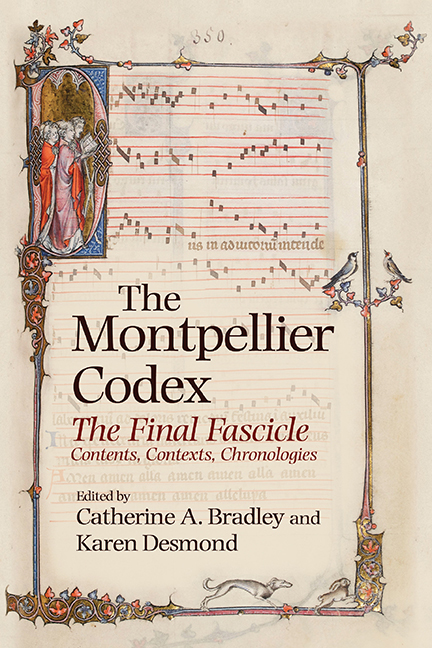Book contents
- Frontmatter
- Contents
- Figures
- Musical examples
- Tables
- Acknowledgements
- List of manuscript sigla
- Abbreviations
- Table of fascicle 8 contents
- Introduction
- I The Material Object
- II INNOVATION AND TRADITION
- 8 Texture, Rhythm, and Stylistic Groupings in Montpellier 8 Motets
- 9 Je le temoin en mon chant: The Art of Diminution in the Petronian Triplum
- 10 How Rhythmically Innovative is Montpellier 8?
- 11 Re-Presentation in the Ars antiqua: From Chant to Polyphony
- 12 … Que ne dit ‘cief bien seans’: Quoting Motets in Montpellier 8
- III ANALYTICAL CASE STUDIES
- Bibliography
- Contributors
- General index
- Index of compositions, alphabetical
- Index of compositions in Mo, manuscript order
- Miscellaneous Endmatter
11 - Re-Presentation in the Ars antiqua: From Chant to Polyphony
from II - INNOVATION AND TRADITION
Published online by Cambridge University Press: 04 July 2019
- Frontmatter
- Contents
- Figures
- Musical examples
- Tables
- Acknowledgements
- List of manuscript sigla
- Abbreviations
- Table of fascicle 8 contents
- Introduction
- I The Material Object
- II INNOVATION AND TRADITION
- 8 Texture, Rhythm, and Stylistic Groupings in Montpellier 8 Motets
- 9 Je le temoin en mon chant: The Art of Diminution in the Petronian Triplum
- 10 How Rhythmically Innovative is Montpellier 8?
- 11 Re-Presentation in the Ars antiqua: From Chant to Polyphony
- 12 … Que ne dit ‘cief bien seans’: Quoting Motets in Montpellier 8
- III ANALYTICAL CASE STUDIES
- Bibliography
- Contributors
- General index
- Index of compositions, alphabetical
- Index of compositions in Mo, manuscript order
- Miscellaneous Endmatter
Summary
THIS study is closely related to aspects of David Maw's chapter in this volume on the connection between organal passages, chant, and Petronian motets. Beginning from Jacques Derrida's notion of moments of ‘openness’ as pertaining to flexibility or improvisation in the performance or dissemination of a given work, the topics of rhythmic and melodic flexibility as inherent parts of performance in the genres of chant, organum, and motet will be addressed. The discussion of chant and organum will provide the background for how moments of ‘openness’ might be identified in the repertory of Mo 8, focusing first on the semibreve flourishes that typically occur at the end of a given perfection in a motet, and second on the groups of more than three semibreves, which are commonly referred to as Petronian semibreves.
‘OPENNESS’ AND MELODIC FLEXIBILITY IN CHANT AND ORGANUM
Oscar Mascarenas, in his dissertation ‘Exposing the Play in Gregorian Chant: The Manuscript as an Opening of Re-presentation’, outlines a third stream in chant studies that addresses the variable melodic formulae in chant. The first two streams are well known. The first argues that the variable versions of a chant as seen in the surviving manuscripts are clues to discovering the path of a given chant through time. From these clues we may create stemmae of influence and hypothesize an ideal original form of the chant. The surviving chant is therefore viewed as degenerating from this original form. The second stream is closely related to the first, but takes the view that variant forms represent a particular house style exemplified by a composer/scribe. Rather than deteriorations, these variants are viewed as progressive recompositions, reimagining the chant to the exact compositional specifications of a particular manuscript or context. The changes made are thus intentional changes to accommodate these concerns.
Mascarenas's answer to the question of variance in chant transmission is that variable elements represent passages of flexible, unfixed, melodic content. He refers to such moments and the act of creating performances from these manuscripts as moments of ‘openness’ that he defines as follows:
An opening is seen here … to convey various senses/meanings … in terms of the derridean dissemination. An opening as a space/gap/aperture, a window (of opportunity); an opening, a sort of undefined commencement, a gateway, a way in, a means of access; a perennial act of openness.
- Type
- Chapter
- Information
- The Montpellier CodexThe Final Fascicle. Contents, Contexts, Chronologies, pp. 197 - 210Publisher: Boydell & BrewerPrint publication year: 2018



